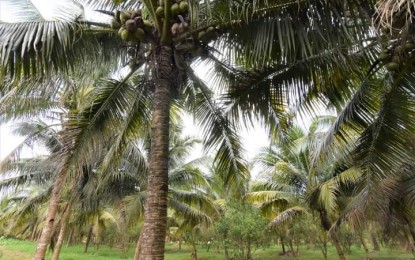
EMERGENCY MEASURES. A coconut plantation in Negros Occidental. Governor Eugenio Jose Lacson on Tuesday (Aug. 15, 2023) ordered the establishment of emergency measures to control and manage the spread of the coconut pest Aspidiotus rigidus or “cocolisap” in at least four localities to protect the livelihood of the province’s almost 14,000 coconut farmers. (File photo courtesy of PIO Negros Occidental)
BACOLOD CITY – Negros Occidental’s provincial government is establishing emergency measures to control and manage the spread of the coconut pest Aspidiotus rigidus, also known as “cocolisap,” to protect the livelihood of the province’s almost 14,000 coconut farmers.
As of Tuesday, scale infestation and attacks on high-value crops cultivated under coconuts have been verified in at least four local government units (LGUs) here – the cities of Bago and La Carlota as well as the municipalities of Murcia and La Castellana.
"To ensure the preservation and development of this vital industry, there is a need to put in place immediate and comprehensive measures to effectively control, manage and eventually eradicate the scale insect infestation," Governor Eugenio Jose Lacson said in Executive Order 23-36.
Lacson designated the Philippine Coconut Authority (PCA) as the lead agency that would collaborate with the LGUs, partner agencies, and barangays, with the support of the provincial government through the Office of the Provincial Agriculturist.
Data showed that Negros Occidental has 5.03 million coconut trees, 2.5 million of which are bearing a potential income of PHP18.7 million, particularly in copra production.
"This massive infestation of scale insect poses a very serious threat to the coconut industry and to the livelihood of those who depend thereon," Lacson said.
The “cocolisap”, which attaches itself to coconut leaves and feeds on the tree's sap, has a distinct characteristic of secreting a waxy coating for defense, which resembles fish scales.
Lacson directed the PCA to formulate and prescribe the necessary and appropriate emergency measures and methodologies in the treatment of coconut trees and other host plants, and to declare infested areas to be under quarantine.
He also ordered the establishment of checkpoints and quarantine stations to prevent the transportation of unprocessed/ untreated parts of coconut, coconut seedlings and other host/ vector plants.
Coconut leaves/ fronds, young coconut and other raw or unprocessed/ untreated coconut products, coconut seedlings and seedlings of other scale insect host plants are prohibited from being transported outside of barangays, municipalities or provinces duly declared under quarantine due to scale insect infestation.
Transport will only be allowed when supported by a permit to transport duly issued by the PCA, provided appropriate preventive measures, such as spraying of appropriate chemicals, have been instituted. (PNA)
